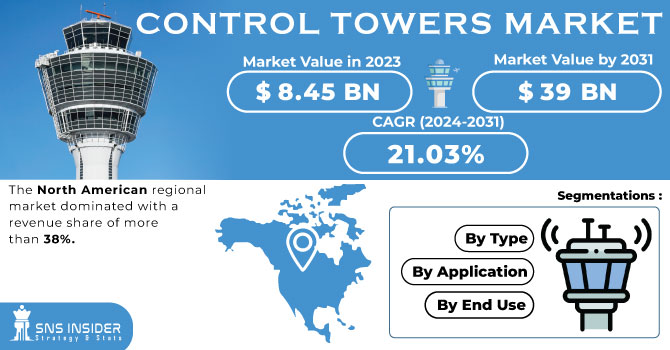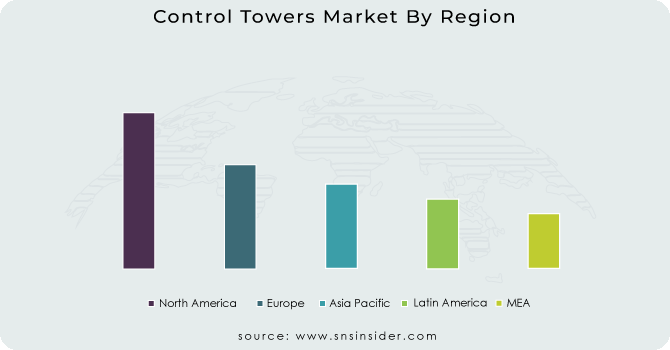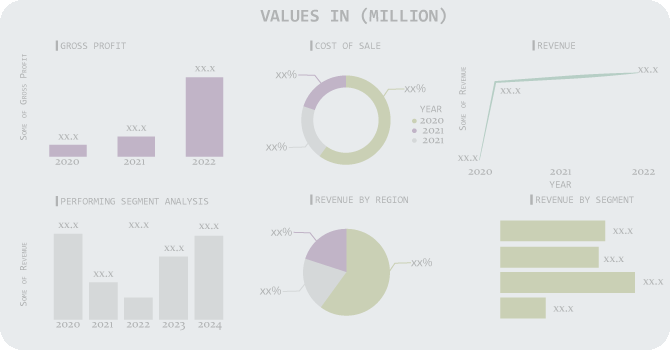Control Towers Market Report Scope & Overview:

To get more information on Control Towers Market - Request Free Sample Report
The Control Towers Market Size was esteemed at USD 8.53 billion in 2023 and is supposed to arrive at USD 51.64 billion by 2032 with a growing CAGR of 22.15% over the forecast period 2024-2032. This report offers unique insights into the Control Towers Market, focusing on key trends like the adoption of control towers, operational efficiency improvements, and technological integration across regions. It highlights the growing importance of supply chain visibility and optimization, with companies increasingly relying on advanced technologies to enhance real-time decision-making. The report also explores how organizations are leveraging control towers to reduce downtime and improve overall operational performance. By examining these trends, it provides a deeper understanding of how digital tools are transforming supply chain management for greater efficiency and responsiveness.
MARKET DYNAMICS
DRIVERS
-
The increased demand for supply chain visibility drives the control towers market by enabling businesses to track goods, monitor performance, and manage disruptions in real time.
The increased demand for supply chain visibility is a significant driver for the control towers market, as businesses strive for real-time insight into their global supply chains. As operations become more complex and interconnected, companies require tools that provide transparency and tracking power at multiple points throughout the supply chain. Control towers serve as a global dashboard for businesses to identify inventory levels, track shipments, assess supplier performance, and evaluate potential disruptions, allowing for advance action. With end-to-end visibility and real-time access to every link in the supply chain, businesses can pinpoint potential bottlenecks, and anticipate and rectify problems before they become serious. Enhanced visibility enables organizations to streamline processes, make faster decisions, and reduce risks to better serve customers. In a world of global sourcing and fast-moving markets, it has become essential to maintain visibility in the supply chain to ensure operational efficiency, delivery timelines, and a competitive edge.
RESTRAINT
-
High initial implementation costs of control tower solutions, including software, infrastructure, and training, can be a significant barrier for SMEs with limited budgets.
The high initial implementation costs of control tower solutions can be a significant barrier, especially for small and medium-sized enterprises (SMEs). Many of these solutions come with a high cost associated with the software, infrastructure, and technology platforms, ranging from cloud solutions to analytics solutions, as well as hardware to manage the next generation of data. Training staff to use these systems also incurs costs, and potentially also consultants' fees for system integration and customization. For SMEs with narrow budgets, it can be prohibitive in the beginning to invest in the same, especially when the long-term benefits like operational efficiency and risk management are not clear and crystal. Consequently, many smaller organizations are likely to defer or not adopt control tower solutions at all in favor of lower-end, lower-cost alternatives. This financial barrier may preclude them from attaining the competitive advantages that increased supply chain visibility and automation can deliver.
OPPORTUNITIES
-
Advancements in AI, machine learning, and predictive analytics enable control towers to provide proactive decision-making, optimizing supply chain operations.
Advancements in AI, machine learning, and predictive analytics are revolutionizing control tower solutions by enabling more sophisticated decision-making and supply chain optimization. These technologies enable control towers to process large volumes of real-time data, identify trends, and forecast potential disruptions allowing businesses to gain a proactive edge. With machine learning algorithms, forecasts can improve in accuracy over time, optimizing elements like transportation routes, demand planning, and inventory levels. Another aspect of AI is giving businesses tools to better leverage actionable insights. Consequently, businesses can improve their operating efficiency, cut costs, and address risks before they become more significant issues. Moreover, predictive analytics facilitates real-time supply chain activity monitoring so that potential problems can be detected and resolved before they become serious. By harnessing the power of historical data, these intelligent technologies offer an adaptive, predictive control tower solution that promotes not only smarter decision-making but more agile supply chains as well.
CHALLENGES
-
Customization of control tower solutions is costly and time-consuming due to the need to address unique supply chain requirements across industries.
Customization needs in the control tower market arise because every organization and industry operates with distinct supply chain complexities. Unique considerations for product types, regional logistics, suppliers, and regulatory requirements per sector make a one-size-fits-all approach impractical. If off-the-shelf control tower solutions provide some standard features, they simply do not address these operational specifics. Customizing a solution to an organization’s needs requires considerable time and resource investment. It means getting familiar with the client’s functions, integrating with systems that already exist, and making the software flexible for particular workflows. This customization process requires further training, support, and system testing and increases costs. This level of tailored solution is even more vital when it comes to industries with extremely specific requirements, such as pharmaceuticals or aerospace. Therefore, while customization offers improved alignment with business goals, it can be both time-consuming and costly, posing challenges for many businesses.
SEGMENTATION ANALYSIS
By Type
The Operational segment dominated with a market share of over 81% in 2023, because it enables real-time decision-making, which is crucial for efficient supply chain management. Operational control towers provide an end-to-end view of all the contractual commitments between a business and its suppliers, with real-time information that enables a company to track goods in transit, as well as monitor and manage its inventories and logistics. This enables organizations to promptly detect and address issues like delays, stockouts, or disruptions, and make necessary adjustments to plans. For businesses wishing to enhance supply chain performance, reduce costs, and improve customer satisfaction, the ability to manage day-to-day activities efficiently is essential. As such, many industries have widely deployed operational control towers to ensure their supply chains run seamlessly, efficiently, and responsively.
By Application
The Supply Chain segment dominated with a market share of over 68% in 2023, due to the increasing need for businesses to achieve end-to-end visibility and optimize complex supply chain operations. In the face of these challenges and the necessity for organizations to optimize their global networks, manage inventory better, forecast demand accurately, and collaborate seamlessly with suppliers, control tower solutions are the answer. They come with real-time information, predictive analytics, and proactive decision-making capabilities that help companies quickly respond to disruptions, cutting down costs, and enhancing customer satisfaction. Supply Chain application soared to the top of the list as one of the most in-control data solutions as supply chains become more complicated and global, as everyone ensures that every part of the supply chain can be fully accounted for by to end customer. This trend is expected to continue as companies prioritize efficiency and resilience in their supply chain strategies.
By End Use
The Healthcare segment dominated with a market share of over 38% in 2023, due to its reliance on efficient and real-time supply chain visibility to ensure the timely delivery of medical supplies, pharmaceuticals, and equipment. The supply chain is particularly opaque due to factors such as strict government regulations, temperature-sensitive logistics, and the requirement to monitor the flow of paramount materials. Control towers empower healthcare organizations to keep track of inventory levels, transportation, and disruptions that could compromise patient safety or regulatory compliance. The growing demand for healthcare, coupled with the complex global landscape of the pharmaceutical supply chain, propels the deployment of these control tower solutions to improve operations, prevent waste, and foster real-time decision-making. As such, healthcare is an important industry for the development of control tower technology.
KEY REGIONAL ANALYSIS
North America region dominated with a market share of over 38% in 2023, primarily due to the region's advanced technological infrastructure, high adoption of digital solutions, and the presence of key players in supply chain management. North America has witnessed a surge in companies adopting control tower solutions to improve visibility, streamline operations, and make better decisions. Dynamics of industries like retail, manufacturing, and healthcare are also boosting market growth for risk management, regulatory compliance, and logistics efficiency. And with a mature e-commerce segment in the region, there is an increasing demand for integrated supply chain solutions. Emphasis on innovation and automation in the U.S. and Canada has helped North America maintain its commanding position in the market.
The Asia-Pacific region is the fastest-growing market for control towers, primarily due to rapid digital transformation and evolving supply chain complexities. The demand for supply chain transparency will grow, especially as countries like China and India, as well as Southeast Asian nations, industrialize rapidly and urbanize. What the Control Tower solutions do is address these challenges and present real-time tracking, predictive analytics, and optimization tools that enhance decision-making. Moreover, the evolution of technology trends, such as the rise of e-commerce, the increase in artificial intelligence (AI), the Internet of Things (IoT), and cloud computing is also driving up the demand for control tower solutions. With the region growing both in terms of manufacturing and trade, organizations are turning to control towers to better navigate the increasingly complex multi-tier supply chain and gain a competitive advantage.

Need any customization research on Control Towers Market - Enquiry Now
Some of the major key players in the Control Towers Market
- Elementum (Supply Chain Orchestration Platform)
- Blue Yonder Group (Luminate Control Tower)
- INFOR (Infor Nexus Control Center)
- DiLX (LogiControl Tower)
- One Network Enterprises (Real Time Value Network)
- ORTEC (ORTEC Control Tower)
- KINAXIS (RapidResponse Control Tower)
- Viewlocity Technologies Pty Ltd (Viewlocity Control Tower Solutions)
- Coupa Software Inc. (Coupa Supply Chain Control Tower)
- o9 Solutions (o9 Digital Brain)
- E2open (E2open Control Tower)
- SAP SE (SAP Logistics Business Network Control Tower)
- PearlChain (PearlChain Control Tower)
- IBM (IBM Sterling Supply Chain Control Tower)
- Oracle (Oracle Transportation Management Control Tower)
- Manhattan Associates (Manhattan Active Supply Chain Control Tower)
- Cisco Systems (Cisco IoT Control Center)
- GE Digital (Predix Supply Chain Control Tower)
- Tata Consultancy Services (TCS) (TCS Digital Supply Chain Control Tower)
- Descartes Systems Group (Descartes Macropoint Control Tower)
Suppliers for (AI-driven supply chain solutions, offering predictive analytics and real-time decision-making) on Control Towers Market
- Blue Yonder Group, Inc.
- SAP SE
- E2open, LLC
- Coupa Software Inc.
- Kinaxis Inc.
- Infor, Inc.
- o9 Solutions, Inc.
- Manhattan Associates, Inc.
- One Network Enterprises
- Oracle Corporation
Elementum-Company Financial Analysis

RECENT DEVELOPMENT
In February 12, 2025: Cisco’s AI solutions, like N9300 Smart Switches and Hybrid Mesh Firewall, align with market control towers by enhancing visibility, security, and decision-making. Cisco’s focus on AI skilling helps businesses manage AI-driven environments, similar to control tower optimization in dynamic markets.
In August 1, 2024: Blue Yonder's acquisition of One Network Enterprises enhanced its supply chain solutions by offering real-time, multi-enterprise collaboration and AI-powered insights. This aligns with the market trend of increasing demand for digital control towers to improve supply chain visibility, agility, and decision-making.
| Report Attributes | Details |
| Market Size in 2023 | USD 8.53 Billion |
| Market Size by 2032 | USD 51.64 Billion |
| CAGR | CAGR of 22.15% From 2024 to 2032 |
| Base Year | 2023 |
| Forecast Period | 2024-2032 |
| Historical Data | 2020-2022 |
| Report Scope & Coverage | Market Size, Segments Analysis, Competitive Landscape, Regional Analysis, DROC & SWOT Analysis, Forecast Outlook |
| Key Segments | • By Type (Analytical, Operational) • By Application (Supply Chain, Transportation) • By End Use (Aerospace & Defense, Chemicals, Retail & Consumer Goods, Healthcare, Manufacturing, High Technology Products, Others) |
| Regional Analysis/Coverage | North America (US, Canada, Mexico), Europe (Eastern Europe [Poland, Romania, Hungary, Turkey, Rest of Eastern Europe] Western Europe] Germany, France, UK, Italy, Spain, Netherlands, Switzerland, Austria, Rest of Western Europe]), Asia Pacific (China, India, Japan, South Korea, Vietnam, Singapore, Australia, Rest of Asia Pacific), Middle East & Africa (Middle East [UAE, Egypt, Saudi Arabia, Qatar, Rest of Middle East], Africa [Nigeria, South Africa, Rest of Africa], Latin America (Brazil, Argentina, Colombia, Rest of Latin America) |
| Company Profiles | Elementum, Blue Yonder Group, INFOR, DiLX, One Network Enterprises, ORTEC, KINAXIS, Viewlocity Technologies Pty Ltd, Coupa Software Inc., o9 Solutions, E2open, SAP SE, PearlChain, IBM, Oracle, Manhattan Associates, Cisco Systems, GE Digital, Tata Consultancy Services (TCS), Descartes Systems Group. |

